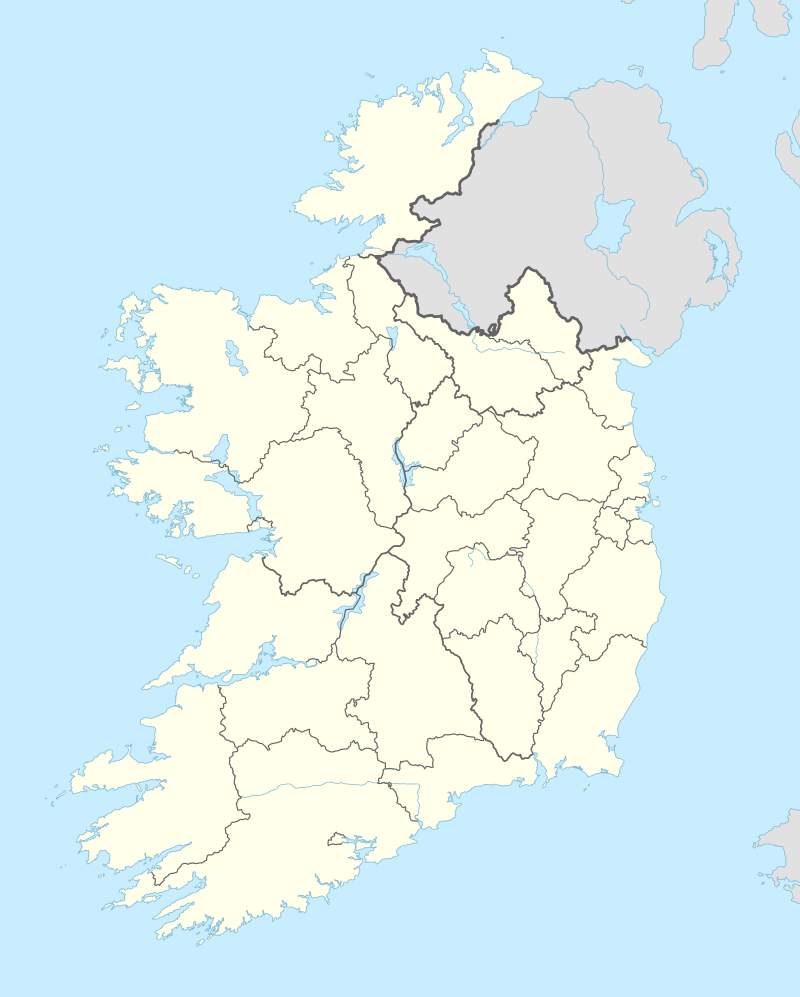Ballinlough, Cork
| Ballinlough Baile an Locha | |
|---|---|
| Suburb | |
 Ballinlough Location in Ireland | |
| Coordinates: 51°53′22″N 8°26′47″W / 51.88944°N 8.44639°WCoordinates: 51°53′22″N 8°26′47″W / 51.88944°N 8.44639°W | |
| Country | Ireland |
| Administrative area | Cork (city) |
| Time zone | WET (UTC+0) |
| • Summer (DST) | IST (WEST) (UTC-1) |
Ballinlough (Irish: Baile an Locha, meaning "town of the lake")[1] is a mainly residential townland and suburb on the southside of Cork city, in Ireland. It is located between Ballintemple and the larger suburbs of Douglas and Blackrock.
History

Among the earliest written references to the townland and then village of Ballinlough date from 1601 (as "Ballinlogha") in the Calendar to Fiants of reign of Henry VIII,[2] and from 1655 (as "Ballinloghy") in the Down Survey.[3] These Irish language names ("Baile an Locha", the town of the lake) reflected the position of the village focal-points (including Ballinlough House and the original Ballinlough school), close to Lough Mahon and the Douglas River Estuary.[4] The Ballinlough Stone, a standing stone near Ballinlough House, was surveyed by antiquary Thomas Crofton Croker in the early 19th century.[5][6] Later archaeological surveys of the stone question whether its origins are prehistoric, or if it is a less ancient boundary marker.[6][7]
In the 19th century, land use in the area was mainly focused on farming and market gardening.[6][8] The larger farms were managed from estate houses including Ballinlough House, Ardfallen House, Thorn Hill House, and LakeVille/Ravenscourt.[6][8]
From the early 20th century, with Cork city expanding east, and the village expanding west, the area became more suburbanised. This included the building of housing developments during the 1920s and 1930s in the neighbouring and sub-townlands of Browingstown, Coppingers Stang, and Knockrea.[6][8][9] Early 20th century censuses however still recorded 17 market gardeners in the area.[9] With the construction of a new church in 1938,[10] two additional schools in 1944 and 1965,[11][12] and a later community centre, the focal-points of the (now) suburb shifted westward towards the city. Previously separated by remaining green belts and outside the city's administrative area, Ballinlough is now within the Cork City Council administrative boundary and zoned as a suburban residential area.[8][13]
Amenities
There are three primary schools situated in Ballinlough: St. Anthony's Boys National School, Eglantine Girls National School, and Our Lady of Lourdes Girls National School.[14][15][16]
The community centre in Ballinough includes a public park and a number of buildings which host community activities. The main building hosts a Montessori school, bowls and bingo events.[17] The 38th/40th Cork Scout Group (a member of Scouting Ireland) is also based in the community centre in Ballinlough,[18] as are the Junior, Intermediate and Senior youth clubs (affiliated with Ógra Chorcaí).[19]
Ballinlough is an independent parish of the Cork and Ross Catholic Diocese and is home to Our Lady of Lourdes Church.[20]
Ballinlough Tennis Club has five outdoor courts in the community centre complex,[21] and the Páirc Uí Rinn Gaelic Athletic Association grounds and the Cork Constitution rugby club lie on the border between Ballinlough and Ballintemple.
Notable residents
- Ray Cummins - former Cork hurling and Gaelic football dual player, was born in Ballinlough in 1948
- Micheál Martin - leader of Fianna Fáil and former minister of Foreign Affairs, Education and Health, resides in Ballinlough[22]
Bordering suburbs
 |
Turners Cross | Ashton | Ballintemple, Cork |  |
| Douglas | |
Beaumont | ||
| ||||
| | ||||
| Douglas | Tramore River Estuary | Mahon, Cork |
References
- ↑ Irish Placenames Database. "Baile an Locha/Ballinlough". logainm.ie. Retrieved 14 January 2016.
- ↑ "Calendar to Fiants of reign of Henry VIII. 1510-47 of Queen Elizabeth. 1558-1603". folio 6539. RLK (1875-90) – via Placenames Commission #13734 .
- ↑ William Petty (1655). "Down Survey" (Map). Cork Liberties. Retrieved 29 May 2016.
- ↑ Ordnance Survey of Ireland. Map of Ballinlough (23" scale, 1897-1913) (Map). Retrieved 29 May 2016.
- ↑ Kieran McCarthy. "South East Ward History". Retrieved 29 May 2016.
- 1 2 3 4 5 Richard Henchion (2005). East to Mahon : the story of Blackrock, Ballintemple, Ballinlough, Ballinure and Mahon. Dahadore. pp. 1–25. ISBN 9780954129323.
- ↑ Cremen, C (1926). "The Ballinlough Stone" (PDF). Journal of the Cork Historical and Archaeological Society. 2. CHAS. XXXI: 104–105.
- 1 2 3 4 C Ó Foghlú (1989). "A Glimpse of Ballinlough". Ballinlough Community Association. Archived from the original on 26 March 2016.
- 1 2 Cork Independent. "Historical walking tour of Ballinlough". Retrieved 29 May 2016.
- ↑ Ballinlough Parish. "Our Lady of Lourdes Church Ballinlough - 75th Anniversary". Archived from the original on 23 July 2014.
- ↑ Our Lady of Lourdes School. "History of Our Lady of Lourdes N.S.". Retrieved 29 May 2016.
- ↑ St Anthonys BNS. "School History". Retrieved 29 May 2016.
- ↑ Cork City Council (2004). "Cork City Development Plan 2004 - Chapter 10 - Suburban Areas (Land Use Zonings)" (PDF). p. 165. Retrieved 10 June 2016.
- ↑ "Eglantine Primary School - School History / About". Eglantine.ie. Retrieved 14 January 2016.
- ↑ "Our Lady of Lourdes School - About". OurLadyOfLourdesNS.com. Retrieved 14 January 2016.
- ↑ "St. Anthony's Primary School, Ballinlough, Cork - History". StAnthonys.ie. Retrieved 14 January 2016.
- ↑ "Association Activities". Ballinlough Community Association. Archived from the original on 26 March 2016.
- ↑ "38th/40th Cork – Ballinlough Scouts". BallinloughScouts.com. Retrieved 14 January 2016.
- ↑ "Ógra Chorcaí Ltd. - The Cork Youth Association". Homepage.eircom.net. 29 October 1998. Retrieved 14 January 2016.
- ↑ Ruth Egan (Fireball Media). "Parishes > Ballinlough". Diocese of Cork and Ross. Retrieved 14 January 2016.
- ↑ "Tennis Club Facilities". Ballinlough Tennis Club. Retrieved 14 January 2016.
- ↑ Seán Donnelly (6 June 2002). "Micheal Martin Profile from Elections 2002". ElectionsIreland.org. Retrieved 14 January 2016.